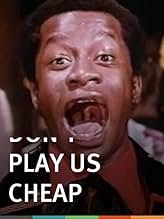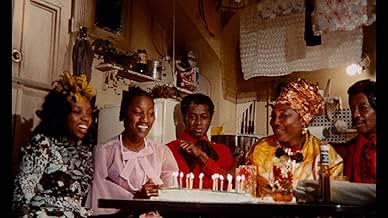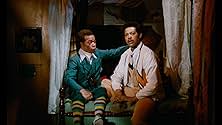Agrega una trama en tu idiomaAs an African American family and friends gather in an apartment for a house party, two imps take human form in order to break up the party.As an African American family and friends gather in an apartment for a house party, two imps take human form in order to break up the party.As an African American family and friends gather in an apartment for a house party, two imps take human form in order to break up the party.
Jay Van Leer
- Mrs. Johnson
- (as Jay Vanleer)
Joe Keyes Jr.
- Trinity
- (as Joseph Keyes)
- Dirección
- Guionista
- Todo el elenco y el equipo
- Producción, taquilla y más en IMDbPro
Argumento
¿Sabías que…?
- TriviaFilm features two of the most popular black actresses from 70's black sitcom history. Ester Rolle from Good Times and Mabel King from What's Happening.
Opinión destacada
My review was written in June 1990 after watching the movie at MoMA's screening room.
Melvin Van Peebles' film of his play "Don't Play Us Cheap" is an entertaining artifact made 18 year ago. Put on the shelf after having only benefit screenings in 1972/73, pic offers some terrific musical numbers and an ebullient look at black culture of a generation back.
Utilizing the same cast that he directed on Broadway, Van Peelbes creates the atmosphere of a house party in Harlem that's a direct forerunner of the Hudlin Brothers recent hit "House Party".
His fantasy premise of an imp and little devil creating the party to spoil it out of pure meanness allows the filmmaker's militant themes to be expressed in humor and whimsy.
Among the dozen tunes composed by Van Peebles is a show-stopping number "Quittin' Time" sung by lanky George (Ooppee) McCurn. It's a sterling example of the power of recording musical numbers in direct sound, a technique revived for the occasion (two years before Peter Bogdanovich' similarly inclined "At Long Last Love") by Van Peebles, who went to the trouble of building sets in New Mexico and using mobile sound trucks for that purpose.
There's also an extremely complex roundelay of four songs sung together which comes off impressively. Hurting the film's overall impact is van Peebles' use of visual tricks left over from the '60s, particularly superimpositions, that stunt the live performance feel. In particular, coloratura Rhetta Hughes' big number is ruined by the disconcerting multiple images of her overlaid on screen.
Fantasy elements climax with black comedy of topliner Esther Rolle smashing the little devil in the form of a cockroach with a rolled up newspaper. Rolle is in great form as the party hostess, ably supported by an ensemble cast.
Tech credits range from topnotch sound recording to shaky camerawork.. Most setups are filmed using the multiple camera method and both focus and framing are too loose at times. Editing, credited to the filmmaker, is haphazard where a seamless approach would have benefited the "live" feel.
Pic deserves a second round of look-sees by potential distributors, as it sharfes he sme time capsule qualities that finally earned "The Plot Against Harry" a latter-day release.
Melvin Van Peebles' film of his play "Don't Play Us Cheap" is an entertaining artifact made 18 year ago. Put on the shelf after having only benefit screenings in 1972/73, pic offers some terrific musical numbers and an ebullient look at black culture of a generation back.
Utilizing the same cast that he directed on Broadway, Van Peelbes creates the atmosphere of a house party in Harlem that's a direct forerunner of the Hudlin Brothers recent hit "House Party".
His fantasy premise of an imp and little devil creating the party to spoil it out of pure meanness allows the filmmaker's militant themes to be expressed in humor and whimsy.
Among the dozen tunes composed by Van Peebles is a show-stopping number "Quittin' Time" sung by lanky George (Ooppee) McCurn. It's a sterling example of the power of recording musical numbers in direct sound, a technique revived for the occasion (two years before Peter Bogdanovich' similarly inclined "At Long Last Love") by Van Peebles, who went to the trouble of building sets in New Mexico and using mobile sound trucks for that purpose.
There's also an extremely complex roundelay of four songs sung together which comes off impressively. Hurting the film's overall impact is van Peebles' use of visual tricks left over from the '60s, particularly superimpositions, that stunt the live performance feel. In particular, coloratura Rhetta Hughes' big number is ruined by the disconcerting multiple images of her overlaid on screen.
Fantasy elements climax with black comedy of topliner Esther Rolle smashing the little devil in the form of a cockroach with a rolled up newspaper. Rolle is in great form as the party hostess, ably supported by an ensemble cast.
Tech credits range from topnotch sound recording to shaky camerawork.. Most setups are filmed using the multiple camera method and both focus and framing are too loose at times. Editing, credited to the filmmaker, is haphazard where a seamless approach would have benefited the "live" feel.
Pic deserves a second round of look-sees by potential distributors, as it sharfes he sme time capsule qualities that finally earned "The Plot Against Harry" a latter-day release.
- lor_
- 16 may 2023
- Enlace permanente
Selecciones populares
Inicia sesión para calificar y agrega a la lista de videos para obtener recomendaciones personalizadas
- How long is Don't Play Us Cheap?Con tecnología de Alexa
Detalles
Contribuir a esta página
Sugiere una edición o agrega el contenido que falta

Principales brechas de datos
By what name was Don't Play Us Cheap (1972) officially released in Canada in English?
Responda





















